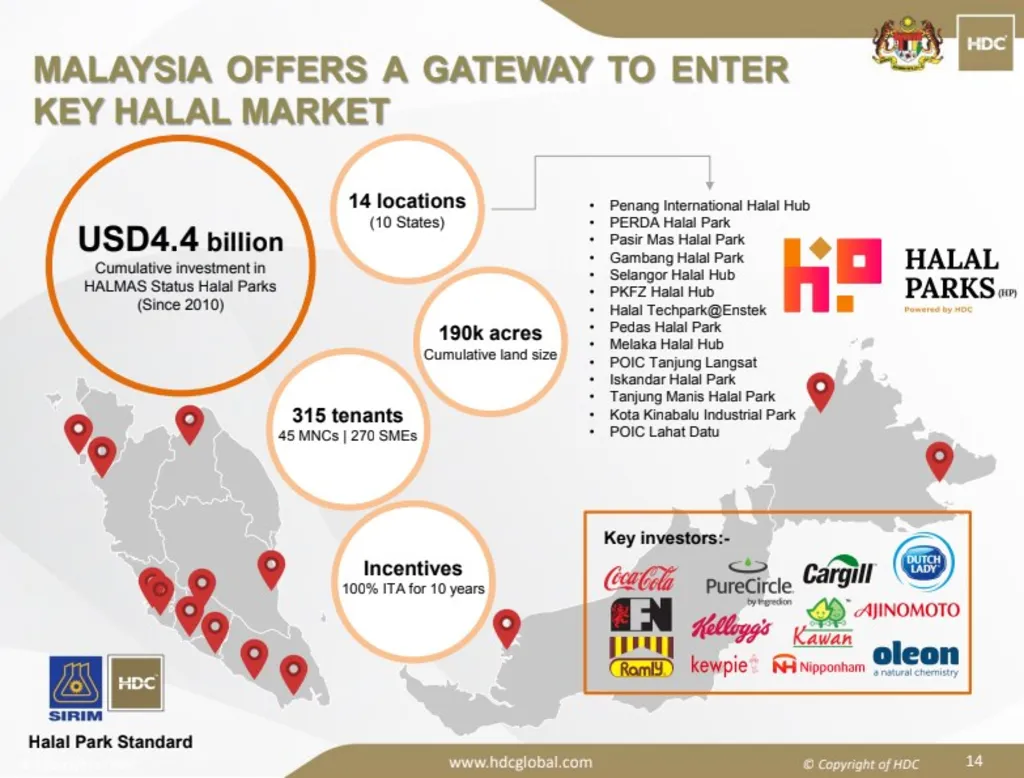Malaysia is fast becoming a global force in the halal economy. The country’s halal industry contributed 7.8% to GDP in 2018 and is projected to grow to 11% by 2030. This growth reflects not only local demand but also the country’s rising influence in the global halal market. By 2030, the halal GDP value is expected to reach USD 58.5 billion, more than doubling from USD 28 billion in 2018. Driving Malaysia Halal Industry Growth momentum is a mix of strong government backing, global certification leadership, and a well-established halal ecosystem.
Strong Malaysia Halal Industry Growth: Halal Food and Exports
One of the most dynamic segments is halal food. In 2024, Malaysia’s halal food market was valued at USD 50.66 billion. It’s expected to reach USD 77.18 billion by 2031, growing at a compound annual growth rate (CAGR) of 6.2%.
On the global stage, Malaysia’s halal industry is projected to reach USD 113.2 billion by 2030, contributing around 2% to the global halal market. Halal exports currently bring in USD 8 billion annually, making up roughly 5.1% of total national exports.
Countries like Japan, China, Singapore, and the US import Malaysian halal products, showing strong international trust in the nation’s halal certification. Malaysia’s reputation as a global benchmark for halal standards gives its businesses a distinct advantage in entering new markets.
Read Also: Malaysia Halal Industry Development and Its Hidden Potential
Opportunities: Global Leadership and Local Innovation
Malaysia’s halal certification system is considered one of the most rigorous and credible globally. This has positioned the country as a trusted source of halal goods and expertise, opening doors to new trade partnerships and export growth.

The government is also promoting the halal industry through various initiatives, from trade missions to support for digitalization. These efforts aim to strengthen Malaysia’s role as a global halal hub and to scale up its industry for long-term impact.
Challenges in Malaysia Halal Industry Growth
Despite these opportunities, challenges persist, especially for micro, small, and medium enterprises (MSMEs). Many struggle with halal certification processes, high compliance costs, and limited access to halal-certified suppliers.
Financing is another barrier. While demand is growing, many small businesses lack the capital to expand or upgrade to meet halal standards. This restricts their ability to scale and benefit from broader market opportunities.
Regulatory inconsistencies also pose issues. The lack of global standardization in halal guidelines and limited coordination between agencies can create confusion for exporters and limit access to some markets.
Read Also: The Emotional Global Pull of Malaysia Islamic Finance Trends
Malaysia Halal Industry Growth: A Growing Giant with Global Reach
Malaysia Halal Industry Growth is accelerating, and the numbers are compelling. With a projected value of USD 113.2 billion by 2030, the industry is both a key economic driver and a tool of global soft power. Yet, for Malaysia to sustain and maximize its momentum, addressing MSME barriers and regulatory clarity will be crucial. With targeted reforms and stronger support systems, the country can not only meet its domestic targets but also lead the world in shaping the future of halal commerce.







